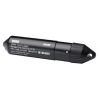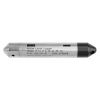HOBO MX2001 Water Level Loggers
Features
- Wireless data offload to mobile devices or Windows computers via Bluetooth
- Integrated barometric pressure sensor enables direct water level readout
- Powered by two user-replaceable AA batteries in the top-end unit
- Expedited repair and warranty service
- Lifetime technical support
- More
Overview
The HOBO MX2001 water level data logger is designed for convenient wireless setup and download from mobile devices via Bluetooth Low Energy. The MX2001 consists of a top-end logger unit and water level sensor. The logger simplifies and lowers the cost of field data collection by providing wireless access to high-accuracy water level and temperature measurements right from a mobile phone, tablet, or Windows computer, with Onset's free HOBOconnect app. Direct-read cables (sold separately) can be ordered in lengths from 0.2 to 500m for deployment in a wide range of wells.
Benefits
- Integrated barometric pressure sensor enables direct water level readout
- Direct-read cable connects the sensor to top-end logger/transmitter
- Cables are reinforced with Kevlar
- Cables are interchangeable, so loggers are easy to redeploy in future applications
- Cable length can vary up to 3% from the length ordered
- Available cable lengths are 1, 5, 10, 15, 30 and 60 meters
- Reference water level can be entered at the start of the deployment
- Use HOBOconnect for setup, data viewing, and data sharing
- Several logging modes: normal, multi-rate logging and event-triggered burst-logging
- Durable ceramic sensor
- Available with stainless steel or titanium sensor ends
- 3-point NIST-traceable calibration certificate included for the water pressure sensor
- HOBO MX2001 consists of a top-end logger unit and water level sensor
- Two AA 1.5 V batteries
In The News
Monitoring Aquatic Ecosystems: How Science Drives Waterway Management in Northwest Georgia
The University of Georgia is home to multiple labs that focus on monitoring aquatic ecosystems and organisms across the state. The River Basin Center connects these monitoring efforts with external partners, including government agencies and NGOs, to inform management and restoration of the state’s waterways. Phillip Bumpers is a Postdoctoral Associate in the Rosemond lab and the Wenger lab at the Odum School of Ecology and an affiliate of the River Basin Center. An aquatic ecologist, Bumpers’ research focuses on quantifying how environmental variability shapes aquatic ecosystems and understanding the drivers of these trends.
Read MoreFrom Paddles to Phytoplankton: Studying Vermont’s Wildest Lakes
For six months of the year, Rachel Cray, a third-year PhD student at the Vermont Limnology Laboratory at the University of Vermont, lives between a microscope and her laptop, running data. For the other six months, she is hiking and canoeing four of Vermont’s lakes, collecting bi-weekly water samples. Cray studies algal phenology across four lakes in Vermont, US, that have low anthropogenic stress—or in other words, are very remote. Funded by the National Science Foundation Career Award to Dr. Mindy Morales, the lakes Cray researches part of the Vermont Sentinel Lakes Program, which studies 13 lakes in the area and, in turn, feeds into the Regional Monitoring Network, which operates in the Northeast and Midwest US.
Read MoreReimagining Water Filtration: How Monitoring and Science Enhance FloWater Filtration Systems
Over 50% of Americans think their tap water is unsafe , according to the Environmental Working Group (EWG). Other recent surveys have found that number to be as high as 70% of persons surveyed. Whether due to increased public awareness of water quality issues or confusion about how municipal water sources are regulated, there is a clear distrust of tap water in the United States. According to industry expert Rich Razgaitis, CEO and co-founder of the water purification company FloWater, this issue creates a damaging cycle. Razgaitis explained that the health and environmental problems associated with contaminated water aren’t the only issues. As people become increasingly aware that some tap water is unsafe, they resort to bottled water.
Read More



















